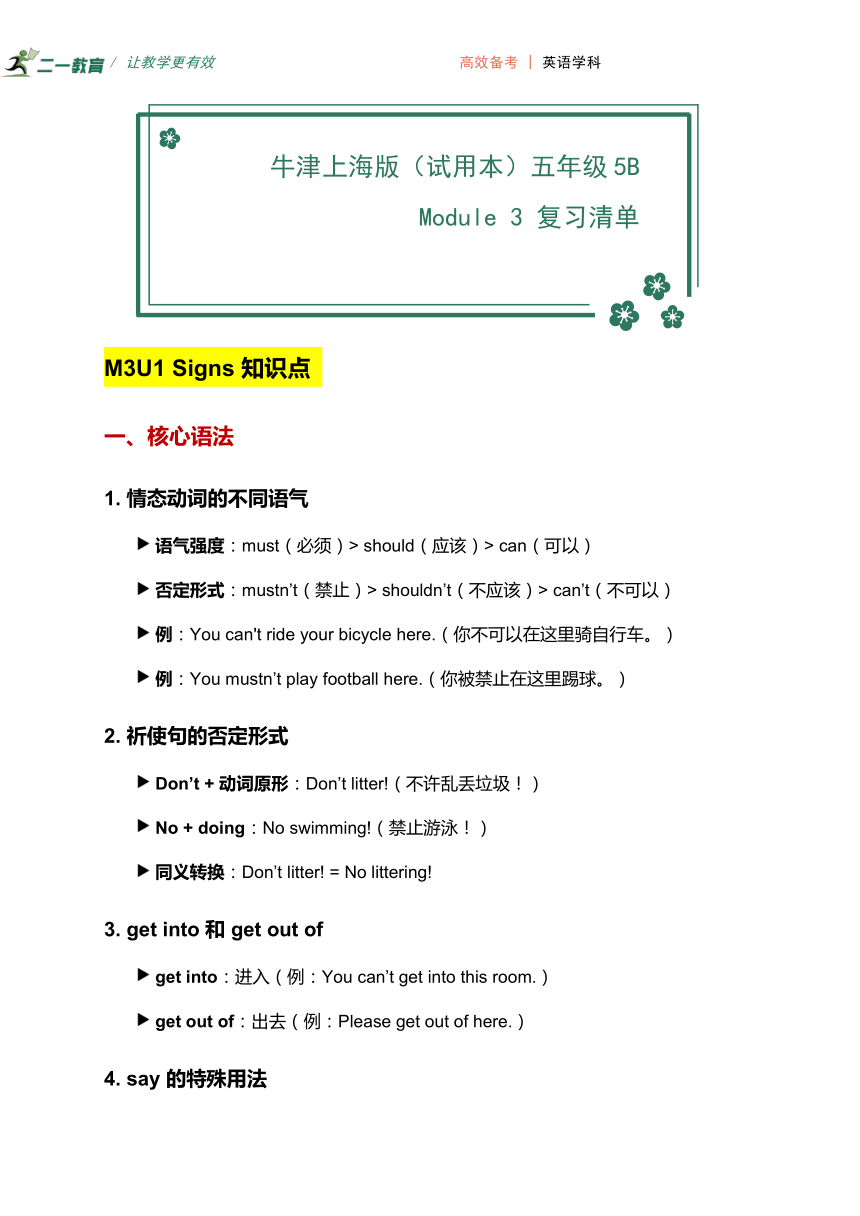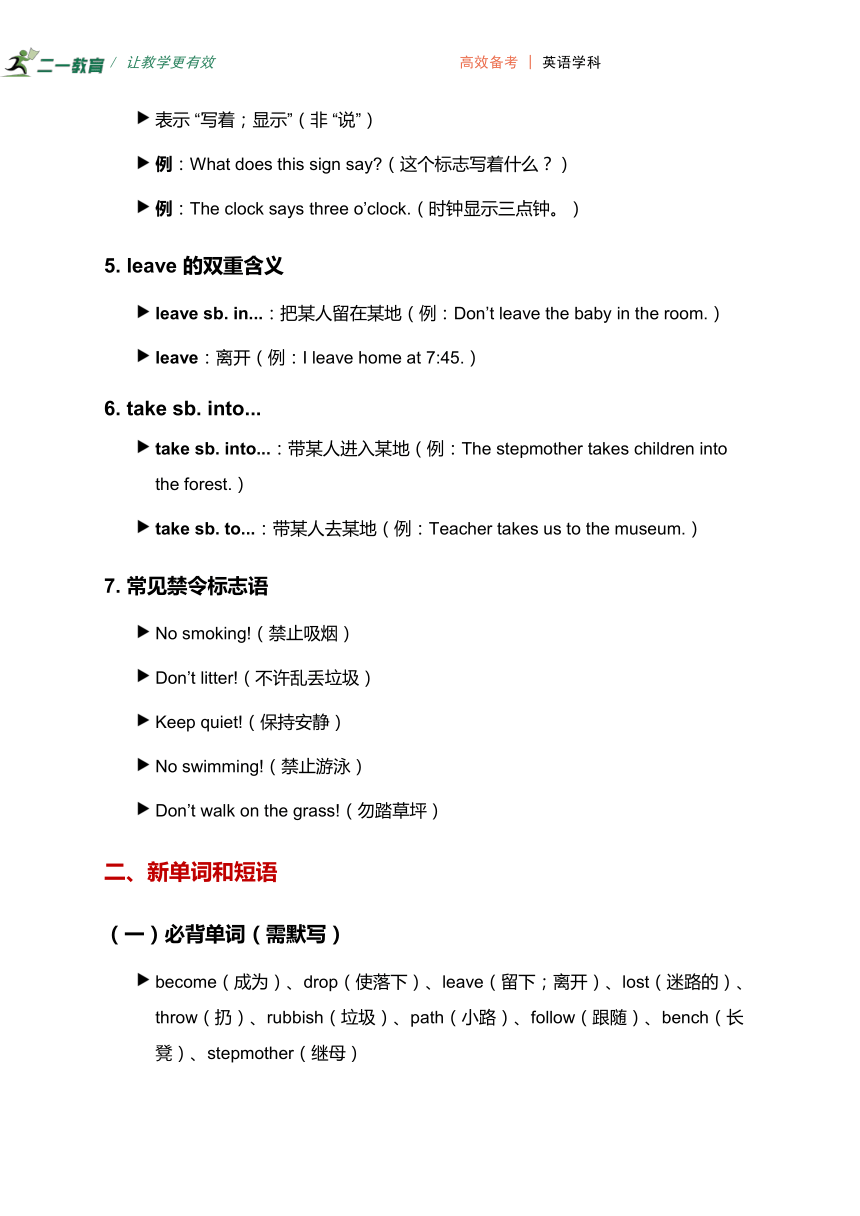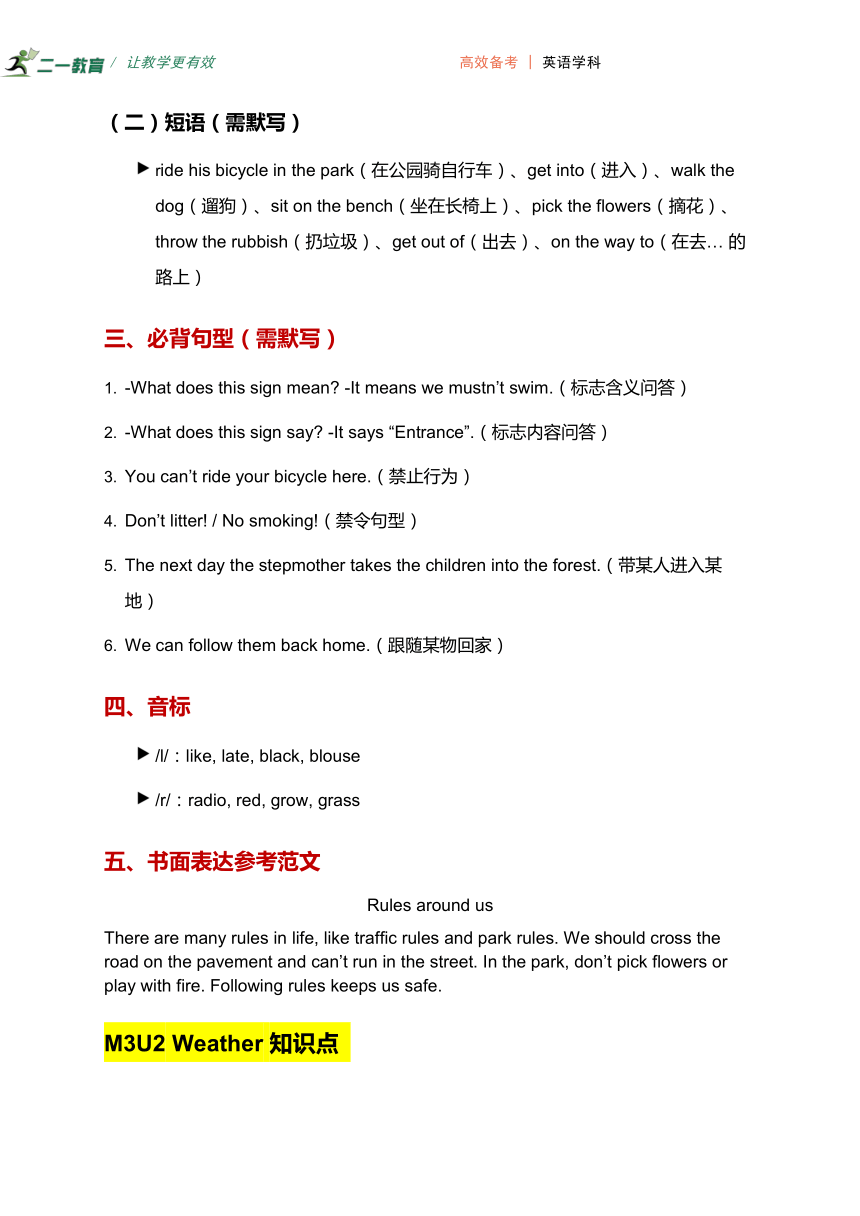小学英语牛津上海版(试用本)五年级下册Module 3 Things around us 复习清单
文档属性
| 名称 | 小学英语牛津上海版(试用本)五年级下册Module 3 Things around us 复习清单 |

|
|
| 格式 | docx | ||
| 文件大小 | 92.3KB | ||
| 资源类型 | 试卷 | ||
| 版本资源 | 牛津上海版(试用本) | ||
| 科目 | 英语 | ||
| 更新时间 | 2025-06-05 11:19:38 | ||
图片预览




文档简介
/ 让教学更有效 高效备考 | 英语学科
M3U1 Signs 知识点
一、核心语法
1. 情态动词的不同语气
语气强度:must(必须)> should(应该)> can(可以)
否定形式:mustn’t(禁止)> shouldn’t(不应该)> can’t(不可以)
例:You can't ride your bicycle here.(你不可以在这里骑自行车。)
例:You mustn’t play football here.(你被禁止在这里踢球。)
2. 祈使句的否定形式
Don’t + 动词原形:Don’t litter!(不许乱丢垃圾!)
No + doing:No swimming!(禁止游泳!)
同义转换:Don’t litter! = No littering!
3. get into 和 get out of
get into:进入(例:You can’t get into this room.)
get out of:出去(例:Please get out of here.)
4. say 的特殊用法
表示 “写着;显示”(非 “说”)
例:What does this sign say (这个标志写着什么?)
例:The clock says three o’clock.(时钟显示三点钟。)
5. leave 的双重含义
leave sb. in...:把某人留在某地(例:Don’t leave the baby in the room.)
leave:离开(例:I leave home at 7:45.)
6. take sb. into...
take sb. into...:带某人进入某地(例:The stepmother takes children into the forest.)
take sb. to...:带某人去某地(例:Teacher takes us to the museum.)
7. 常见禁令标志语
No smoking!(禁止吸烟)
Don’t litter!(不许乱丢垃圾)
Keep quiet!(保持安静)
No swimming!(禁止游泳)
Don’t walk on the grass!(勿踏草坪)
二、新单词和短语
(一)必背单词(需默写)
become(成为)、drop(使落下)、leave(留下;离开)、lost(迷路的)、throw(扔)、rubbish(垃圾)、path(小路)、follow(跟随)、bench(长凳)、stepmother(继母)
(二)短语(需默写)
ride his bicycle in the park(在公园骑自行车)、get into(进入)、walk the dog(遛狗)、sit on the bench(坐在长椅上)、pick the flowers(摘花)、throw the rubbish(扔垃圾)、get out of(出去)、on the way to(在去… 的路上)
三、必背句型(需默写)
-What does this sign mean -It means we mustn’t swim.(标志含义问答)
-What does this sign say -It says “Entrance”.(标志内容问答)
You can’t ride your bicycle here.(禁止行为)
Don’t litter! / No smoking!(禁令句型)
The next day the stepmother takes the children into the forest.(带某人进入某地)
We can follow them back home.(跟随某物回家)
四、音标
/l/:like, late, black, blouse
/r/:radio, red, grow, grass
五、书面表达参考范文
Rules around us
There are many rules in life, like traffic rules and park rules. We should cross the road on the pavement and can’t run in the street. In the park, don’t pick flowers or play with fire. Following rules keeps us safe.
M3U2 Weather 知识点
一、核心语法
1. 天气形容词构成
名词 + -y:cloud→cloudy(多云的)、rain→rainy(下雨的)、snow→snowy(下雪的)、wind→windy(有风的)、sun→sunny(晴朗的)
特殊:storm→stormy(暴风雨的)、fog→foggy(有雾的)
2. 天气问答句型
提问:What’s the weather like today = How’s the weather today (今天天气如何?)
时态示例:
一般过去时:What was the weather like yesterday
It was snowy.(昨天天气)
一般现在时:It’s sunny today.(今天天气)
一般将来时:It will be windy tonight.(今晚天气)
温度提问:What’s the temperature today It’s 30 degrees.(气温问答)
3. help sb. do sth.
帮助某人做某事(例:I help my mum do housework.)
4. make 的双重用法
使…:make sb./sth. + 形容词(例:Sun makes plants strong.)
制作:make a robot(制作机器人)
5. heavy 的多义性
猛烈的:The wind is heavy.(风很猛烈)
沉重的:The box is heavy.(箱子很重)
二、新单词和短语
(一)必背单词(需默写)
cloud(云)、rain(雨)、snow(雪)、wind(风)、sun(太阳)、storm(暴风雨)、degree(度)、weather(天气)、yesterday(昨天)、tomorrow(明天)
(二)短语(需默写)
weather report(天气预报)、help plants grow(帮助植物生长)、a strong wind(一阵大风)、heavy rain(大雨)、thirty degrees(三十度)、come from the East China Sea(来自中国东海)
三、必背句型(需默写)
-What’s the weather like today -It’s rainy.(天气问答)
-What was the weather like yesterday -It was rainy.(过去天气问答)
The rain helps my plants grow.(帮助某物生长)
The sun makes my plants strong.(使某物…)
-What’s the temperature -It’s 27 degrees.(温度问答)
We will have heavy rain and a strong wind tomorrow.(将来天气)
四、书面包表达参考范文
Weather
Yesterday was cloudy and cold. I stayed at home reading. Today is sunny and 25 degrees, so I have a picnic with parents. Tomorrow will be sunny, and I’ll play basketball with friends.
M3U3 Changes 知识点
一、核心语法
1. 家具位置变化表达
过去时:was/were(例:The sofa was under the shelf.)
现在时:is/are(例:Now it is under the window.)
2. surprise 的用法
名词:惊喜(例:Give her a surprise.)
形容词:surprised(惊讶的)(例:Teacher is surprised.)
3. 一般将来时
will + do/be:It will be windy tomorrow.(将来天气)
be doing(表将来):Dad is coming home next week.(下周回家)
4. furniture 的用法
不可数名词(例:a piece of furniture 一件家具;much furniture 很多家具)
5. 感官动词 + 形容词
look(看起来):The living room looks different.
sound(听起来):It sounds fun.
taste(尝起来):Apple tastes sweet.
feel(摸起来):Pineapple feels rough.
smell(闻起来):Flower smells nice.
6. change 的双重词性
名词:变化(例:Changes in Shanghai)
动词:变化(例:Wild geese change homes twice a year.)
7. ago 的用法
表示 “以前”,用于一般过去时(例:two days ago 两天前;I saw him three weeks ago.)
二、新单词和短语
(一)必背单词(需默写)
bookshelf(书架)、mirror(镜子)、cupboard(橱柜)、bed(床)、lamp(灯)、cushion(坐垫)、sofa(沙发)、furniture(家具)、wall(墙)、window(窗)、clock(钟)、change(变化)
(二)短语(需默写)
give sb. a surprise(给某人惊喜)、move the furniture(移动家具)、changes in Shanghai(上海的变化)、many years ago(许多年前)、look different(看起来不同)、a lot of tall buildings(许多高楼)
三、必背句型(需默写)
Let’s move the furniture!(提议移动家具)
The sofa was under the shelf. Now it’s under the window.(位置变化对比)
The living room looks different!(感官动词 + 形容词)
Are there any changes in our living room (询问变化)
Many of them were fishermen and farmers.(他们中的许多人)
四、音标
音标
例词
/ei/
crayon
/ai/
sky
/ i/
noisy
/i /
cheer
/e /
chair
/u /
sure
/ u/
blow
/au/
cloud
五、书面表达参考范文
Changes in my bedroom
There were changes in my bedroom. It was untidy yesterday, but now it’s clean. The model plane was on the chair, now on the shelf. My T-shirt was on the bed, now in the cupboard. I like the new changes.
M3U1 Signs 知识点
一、核心语法
1. 情态动词的不同语气
语气强度:must(必须)> should(应该)> can(可以)
否定形式:mustn’t(禁止)> shouldn’t(不应该)> can’t(不可以)
例:You can't ride your bicycle here.(你不可以在这里骑自行车。)
例:You mustn’t play football here.(你被禁止在这里踢球。)
2. 祈使句的否定形式
Don’t + 动词原形:Don’t litter!(不许乱丢垃圾!)
No + doing:No swimming!(禁止游泳!)
同义转换:Don’t litter! = No littering!
3. get into 和 get out of
get into:进入(例:You can’t get into this room.)
get out of:出去(例:Please get out of here.)
4. say 的特殊用法
表示 “写着;显示”(非 “说”)
例:What does this sign say (这个标志写着什么?)
例:The clock says three o’clock.(时钟显示三点钟。)
5. leave 的双重含义
leave sb. in...:把某人留在某地(例:Don’t leave the baby in the room.)
leave:离开(例:I leave home at 7:45.)
6. take sb. into...
take sb. into...:带某人进入某地(例:The stepmother takes children into the forest.)
take sb. to...:带某人去某地(例:Teacher takes us to the museum.)
7. 常见禁令标志语
No smoking!(禁止吸烟)
Don’t litter!(不许乱丢垃圾)
Keep quiet!(保持安静)
No swimming!(禁止游泳)
Don’t walk on the grass!(勿踏草坪)
二、新单词和短语
(一)必背单词(需默写)
become(成为)、drop(使落下)、leave(留下;离开)、lost(迷路的)、throw(扔)、rubbish(垃圾)、path(小路)、follow(跟随)、bench(长凳)、stepmother(继母)
(二)短语(需默写)
ride his bicycle in the park(在公园骑自行车)、get into(进入)、walk the dog(遛狗)、sit on the bench(坐在长椅上)、pick the flowers(摘花)、throw the rubbish(扔垃圾)、get out of(出去)、on the way to(在去… 的路上)
三、必背句型(需默写)
-What does this sign mean -It means we mustn’t swim.(标志含义问答)
-What does this sign say -It says “Entrance”.(标志内容问答)
You can’t ride your bicycle here.(禁止行为)
Don’t litter! / No smoking!(禁令句型)
The next day the stepmother takes the children into the forest.(带某人进入某地)
We can follow them back home.(跟随某物回家)
四、音标
/l/:like, late, black, blouse
/r/:radio, red, grow, grass
五、书面表达参考范文
Rules around us
There are many rules in life, like traffic rules and park rules. We should cross the road on the pavement and can’t run in the street. In the park, don’t pick flowers or play with fire. Following rules keeps us safe.
M3U2 Weather 知识点
一、核心语法
1. 天气形容词构成
名词 + -y:cloud→cloudy(多云的)、rain→rainy(下雨的)、snow→snowy(下雪的)、wind→windy(有风的)、sun→sunny(晴朗的)
特殊:storm→stormy(暴风雨的)、fog→foggy(有雾的)
2. 天气问答句型
提问:What’s the weather like today = How’s the weather today (今天天气如何?)
时态示例:
一般过去时:What was the weather like yesterday
It was snowy.(昨天天气)
一般现在时:It’s sunny today.(今天天气)
一般将来时:It will be windy tonight.(今晚天气)
温度提问:What’s the temperature today It’s 30 degrees.(气温问答)
3. help sb. do sth.
帮助某人做某事(例:I help my mum do housework.)
4. make 的双重用法
使…:make sb./sth. + 形容词(例:Sun makes plants strong.)
制作:make a robot(制作机器人)
5. heavy 的多义性
猛烈的:The wind is heavy.(风很猛烈)
沉重的:The box is heavy.(箱子很重)
二、新单词和短语
(一)必背单词(需默写)
cloud(云)、rain(雨)、snow(雪)、wind(风)、sun(太阳)、storm(暴风雨)、degree(度)、weather(天气)、yesterday(昨天)、tomorrow(明天)
(二)短语(需默写)
weather report(天气预报)、help plants grow(帮助植物生长)、a strong wind(一阵大风)、heavy rain(大雨)、thirty degrees(三十度)、come from the East China Sea(来自中国东海)
三、必背句型(需默写)
-What’s the weather like today -It’s rainy.(天气问答)
-What was the weather like yesterday -It was rainy.(过去天气问答)
The rain helps my plants grow.(帮助某物生长)
The sun makes my plants strong.(使某物…)
-What’s the temperature -It’s 27 degrees.(温度问答)
We will have heavy rain and a strong wind tomorrow.(将来天气)
四、书面包表达参考范文
Weather
Yesterday was cloudy and cold. I stayed at home reading. Today is sunny and 25 degrees, so I have a picnic with parents. Tomorrow will be sunny, and I’ll play basketball with friends.
M3U3 Changes 知识点
一、核心语法
1. 家具位置变化表达
过去时:was/were(例:The sofa was under the shelf.)
现在时:is/are(例:Now it is under the window.)
2. surprise 的用法
名词:惊喜(例:Give her a surprise.)
形容词:surprised(惊讶的)(例:Teacher is surprised.)
3. 一般将来时
will + do/be:It will be windy tomorrow.(将来天气)
be doing(表将来):Dad is coming home next week.(下周回家)
4. furniture 的用法
不可数名词(例:a piece of furniture 一件家具;much furniture 很多家具)
5. 感官动词 + 形容词
look(看起来):The living room looks different.
sound(听起来):It sounds fun.
taste(尝起来):Apple tastes sweet.
feel(摸起来):Pineapple feels rough.
smell(闻起来):Flower smells nice.
6. change 的双重词性
名词:变化(例:Changes in Shanghai)
动词:变化(例:Wild geese change homes twice a year.)
7. ago 的用法
表示 “以前”,用于一般过去时(例:two days ago 两天前;I saw him three weeks ago.)
二、新单词和短语
(一)必背单词(需默写)
bookshelf(书架)、mirror(镜子)、cupboard(橱柜)、bed(床)、lamp(灯)、cushion(坐垫)、sofa(沙发)、furniture(家具)、wall(墙)、window(窗)、clock(钟)、change(变化)
(二)短语(需默写)
give sb. a surprise(给某人惊喜)、move the furniture(移动家具)、changes in Shanghai(上海的变化)、many years ago(许多年前)、look different(看起来不同)、a lot of tall buildings(许多高楼)
三、必背句型(需默写)
Let’s move the furniture!(提议移动家具)
The sofa was under the shelf. Now it’s under the window.(位置变化对比)
The living room looks different!(感官动词 + 形容词)
Are there any changes in our living room (询问变化)
Many of them were fishermen and farmers.(他们中的许多人)
四、音标
音标
例词
/ei/
crayon
/ai/
sky
/ i/
noisy
/i /
cheer
/e /
chair
/u /
sure
/ u/
blow
/au/
cloud
五、书面表达参考范文
Changes in my bedroom
There were changes in my bedroom. It was untidy yesterday, but now it’s clean. The model plane was on the chair, now on the shelf. My T-shirt was on the bed, now in the cupboard. I like the new changes.
同课章节目录
- Module 1 Using my five senses
- Unit 1 What a mess!
- Unit 2 Watch it grow!
- Unit 3 How noisy!
- Module 2 My favourite things
- Unit 1 Food and drinks
- Unit 2 Films
- Unit 3 School subjects
- Module 3 Things around us
- Unit 1 Signs
- Unit 2 Weathe
- Unit 3 Changes
- Module 4 More things to learm
- Unit 1 Museums
- Unit 2 Western holidays
- Unit 3 Story time
